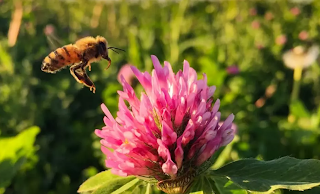Honeybees found to thrive alongside organic farms and annual flowers
Organic farms offer ample food for honeybees along with protection from parasites, according to research published in the Journal of Applied Ecology late Tuesday, an effort to quantify the most effective conservation measures for protecting the pollinators amid big agricultural operations.
"To promote honeybee colony health in agroecosystems, our results suggest that organic agriculture and annual flower strips should be prioritized conservation measures," the researchers say in the study. "Landscape management should consider the merits and demerits of different measures to sustain healthy populations of pollinators in agroecosystems."
Although honeybees often form a symbiotic relationship with farmers, the iconic insect struggles to survive due to pesticide exposure and parasites associated with large-scale agriculture. To understand how to best use the environment to support pollinators, a team of German researchers studied the effect of three conservation measures on colony growth and parasite levels.
Researchers studied 164 newly established honeybee colonies across 16 locations in western Germany throughout lower Saxony and northern Hesse. In a landscape dominated by large-scale agricultural operations, each location contained varying numbers of semi-natural perennial flowers, annual flower strips, and organic farms.
"The way that farmers cultivate their land has a major impact on nature,” said contributing author Robert Paxton, a professor of zoology at Martin Luther University Halle-Wittenberg, in a statement. “Intensively farmed fields, pesticides and monocultures pose a threat to many animal and plant species. This is particularly true for pollinators, which include honeybees.”
Each location provided varying quantities of food and parasite exposure, with organic farms offering the best protection, followed by annual flower strips. Researchers postulate that larger annual flower strips spread parasites out, diluting bee exposure to them. Perennial flower patches provided the least food and highest exposure to virus-carrying mites.
The organic farms studied allowed weeds to grow around fields, supporting honeybees which feed off both crop blooms and wildflowers. Organic farming techniques aiming to deter parasites also benefited the bees.
While organic farming and planting annual flower strips supported healthier honeybee colonies and fewer parasites, the third method tested — maintaining a semi-natural environment — resulted in the smallest bee colonies and the highest concentration of pests.
The Varroa destructor mite often carries viruses, including the deformed wing virus and the black queen cell virus, which can take out an entire colony.
None of the methods tested offered bees significant protection from winter.
The researchers note that their work furthers goals set out in the European Commission’s Green Deal, including having 25% of agricultural lands use organic techniques by the end of the decade.

